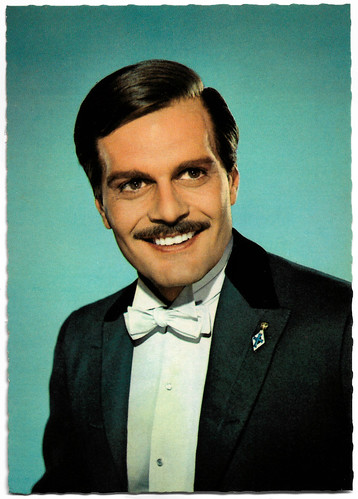
German postcard by ISV, no. H 140.

American postcard. Photo: MGM. Photo: Geraldine Chaplin, Omar Sharif and Julie Christie in Dr. Zhivago (David Lean, 1965).
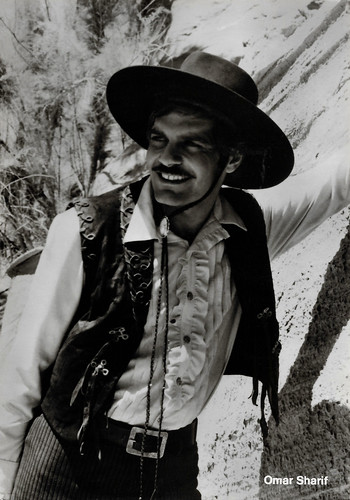
East-German postcard by VEB Progress Film-Vertrieb, Berlin, no. 15/70 D. Omar Sharif in Mackenna's Gold (J. Lee Thompson, 1969).
A box office hit in the Soviet Union
Omar Sharif (Arabian: عمر الشريـف) was born Michel Demitri Shalhoub in 1932 in Alexandria, Egypt to Joseph Shalhoub, a lumber merchant, and his wife, Claire (Saada). Of Lebanese and Syrian extraction, the young Michel was raised a Roman Catholic. He was educated at Victoria College in Alexandria and took a degree in mathematics and physics from Cairo University with a major. Afterwards graduating from university, he entered the family lumber business.
The handsome Sharif became a star in Egyptian cinema. His first film was the Egyptian film Siraa Fil-Wadi/The Blazing Sky (Youssef Chahine, 1954), opposite the renowned Egyptian actress Faten Hamama. The film was presented at the 1954 Cannes Film Festival and was a box office hit in the Soviet Union, where it sold 25.8 million tickets in 1956.
He married Faten Hamama in 1955. He converted to Islam to marry her and took the name Omar al-Sharif. He quickly rose to stardom in Shaytan al-Sahra/The Devil of the Desert (Youssef Chahine, 1954) and Ayyamna al-Holwa/Our Beautiful Days (Helmy Halim, 1954). He also appeared in the French film La Châtelaine du Liban/The Lebanese Mission (Richard Pottier, 1956) starring Jean-Claude Pascal and Gianna Maria Canale.
He and his wife Faten Hamama co-starred as romantic leads in such films in such Egyptian films as Sira` Fi al-Mina/Struggle in the Pier (Youssef Chahine, 1956), La Anam/Sleepless (Salah Abouseif, Tolba Radwan, 1957) and Ard al-Salam/Land of Peace (Kamal El Sheikh, 1957). He also appeared in the French-Tunisian film Goha (Jacques Baratier, 1958), which marked the debut of Claudia Cardinale.
Successful were also the Egyptian films Sayyidat al-Qasr/Lady of the Palace (Kamal El Sheikh, 1958), Sira‘ Fi Al Nil/Struggle on the Nile (Atef Salem, 1959), Bidaya wa nihaya/The Beginning and the End (Salah Abouseif, 1960), Eshaet Hob/A Rumor of Love (Fatin Abdel Wahab, 1960), and the 'Anna Karenina' adaptation Nahr al-Ḥub/The River of Love (Ezz El-Dine Zulficar, 1960). These films made him a huge competitor to Salah Zulfikar, Shoukry Sarhan and Rushdy Abaza, the Egyptian cinema giants at the time.
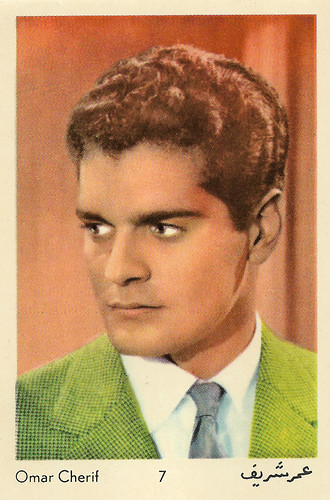
Egyptian collectors card, no. 7.
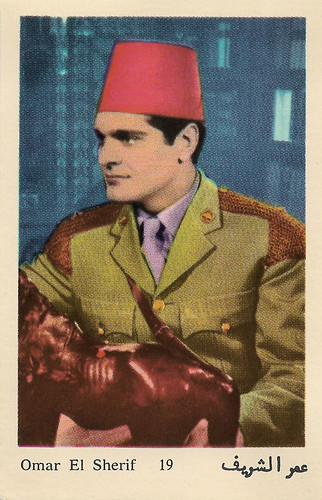
Egyptian collectors card, no. 29.
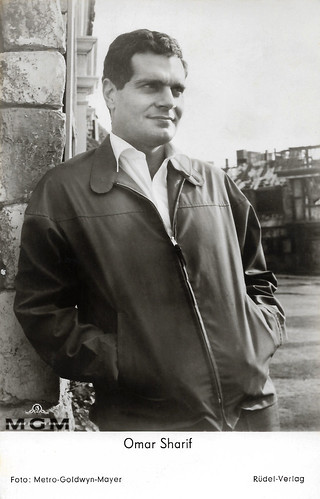
West German postcard by Rüdel-Verlag (Franz Josef Rüdel, Filmpostkartenverlag), Hamburg, no. 4751. Photo: Metro-Goldwyn-Mayer (MGM). Omar Sharif in C'era una volta/More Than a Miracle (Francesco Rosi, 1967).
Persona non grata in Egypt
Omar Sharif made his English-language film debut in the monumental film Lawrence of Arabia (David Lean, 1962), starring Peter O'Toole, Alec Guinness and Anthony Quinn. He played Sherif Ali who was introduced in a famous scene: Sherif rides towards the camera for minutes, coming from the desert horizon.
Lawrence of Arabia was a box office and critical sensation. Sharif was honoured with the Golden Globe Award for Best Newcomer and an Oscar nomination for Best Supporting Actor. The film made Sharif a sought-after star and he played roles in international productions such as The Fall of the Roman Empire (Anthony Mann, 1964) and Genghis Khan (Henry Levin, 1965).
In 1965, Omar Sharif got the coveted title role in one of the most lavish film projects of the 1960s, the monumental film Doctor Zhivago (David Lean, 1965), an adaptation of Boris Pasternak's 1957 novel. Sharif plays a young doctor who falls in love with a nurse (Julie Christie) against the backdrop of the Russian Revolution. The huge success of this classic film, which was one of the biggest box office hits of the decade, established Sharif as a top international star and heartthrob.
He was considered such a box office draw that he was cast as a German army officer in the film The Night of the Generals (Anatole Litvak, 1967) alongside Peter O'Toole. His casting as Crown Prince Rudolf of Austria-Hungary a year later in the historical film Mayerling (Terence Young, 1968) was similarly daring. The musical Funny Girl (William Wyler, 1968), in which Sharif played the second leading role alongside Barbra Streisand, was a great success. Shortly after the Six-Day War in 1967, the on-screen romance between the Jewish Streisand and the Egyptian Muslim Sharif not only hit the headlines. It made him persona non grata in Egypt.
For almost ten years, he was no longer allowed to enter his home country. Sharif played Che Guevara in Che! (Richard Fleischer, 1969) and Colorado in Mackenna's Gold (J. Lee Thompson, 1969), but he was no longer able to build on his earlier successes and ultimately lost his status as a box office star.

East-German postcard by VEB Progress Film-Vertrieb, Berlin, no. 185/70. Omar Sharif in Funny Girl (William Wyler, 1968).
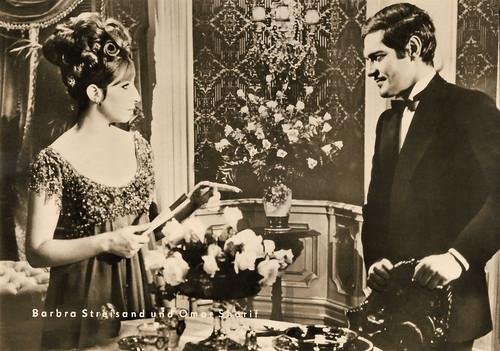
East-German postcard by VEB Progress Film-Vertrieb, Berlin, no. 209/70. Photo: Columbia. Barbra Streisand and Omar Sharif in Funny Girl (William Wyler, 1968).
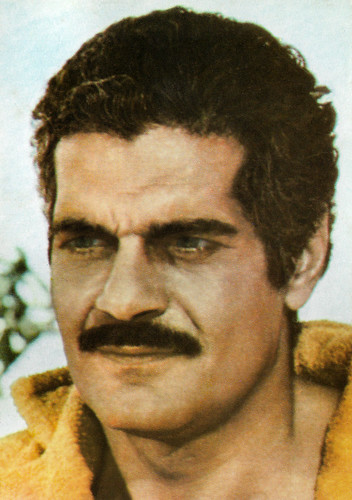
Romanian postcard by Casa Filmului Acin.
One of the world's best-known contract bridge players
In the 1970s, Omar Sharif's roles and films became increasingly insignificant. Sharif had to accept many second-rate films because he had money problems. In 1974 he and Faten Hamama divorced. The couple had one child, Tarek Sharif (1957) who portrayed the young Zhivago in the eponymous picture. Sharif never remarried.
Beginning in the 1960s, Omar Sharif earned a reputation as one of the world's best-known contract bridge players. In the 1970s and 1980s, he co-wrote a syndicated newspaper bridge column for the Chicago Tribune. Sharif also wrote several books on bridge and has licensed his name to a bridge computer game, "Omar Sharif Bridge", which has been marketed since 1992.
From the 1980s onwards, Sharif mainly appeared in television series, supporting roles, low-budget productions and Egyptian films. Sharif told the press in 2006 that he no longer played bridge, explaining, "I decided I didn't want to be a slave to any passion except for my work. I had too many passions, bridge, horses, gambling. I want to live a different kind of life and be with my family more because I didn't give them enough time."
As an actor, Sharif made a comeback in 2003 playing the title role of an elderly Muslim Turkish shopkeeper who becomes a father figure for a Jewish boy in the French film Monsieur Ibrahim et les fleurs du Coran/Monsieur Ibrahim (François Dupeyron, 2003). For his performance, he won the Best Actor Award at the Venice Film Festival and the Best Actor César, France's equivalent of the Oscar, from the Académie des Arts et Techniques du Cinéma. Sharif's later film roles included performances in Hidalgo (Joe Johnston, 2004) with Viggo Mortensen, the Italian TV film San Pietro/Imperium: Saint Peter (Giulio Base, 2005), and One Night with the King (Michael O. Sajbel, 2005) in which he reunited with Peter O'Toole.
Omar Sharif died of a heart attack in 2015, in Cairo, Egypt. In later life, Sharif lived mostly in Cairo with his family and his last partner Andréa Ferréol. In addition to his son Tarek Sharif, he had two grandsons, Omar Sharif Jr and Karim Sharif. Omar Sharif Jr is also an actor.
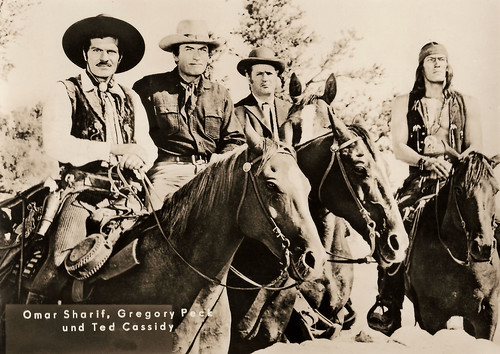
East-German postcard by VEB Progress Film-Vertrieb, Berlin, no. 215/70, 1970. Photo: Omar Sharif, Gregory Peck, Eli Wallach, and Ted Cassidy in Mackenna's Gold (J. Lee Thompson, 1969).

East-German postcard by VEB Progress Film-Vertrieb, Berlin, no. 206/70. Julie Newmar and Omar Sharif in Mackenna's Gold (J. Lee Thompson, 1969).
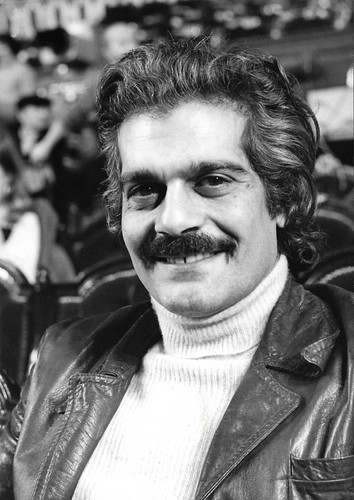
Dutch press photo by KIPPA, Amsterdam. Photo for the TV registration of the Unicef Ballet Gala on 31 December 1972. The ballets were presented by Omar Sharif, Romy Schneider and Ann Miller.
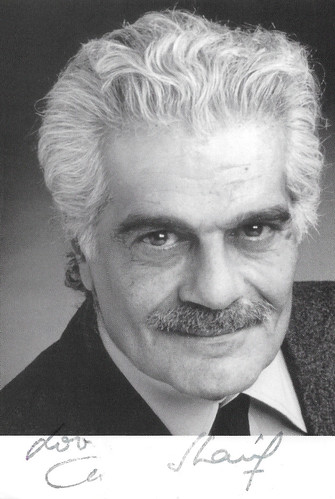
Vintage autograph card.
Sources: Jon C. Hopwood (IMDb), Wikipedia (German, Dutch and English) and IMDb.
No comments:
Post a Comment